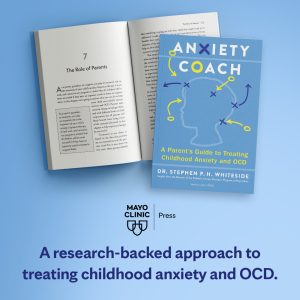Welcome to Mayo Clinic Anxiety Coach
Mayo Clinic Anxiety Coach uses a series of videos and guided questions to help kids, teens, and families make a personalized plan to work on anxiety disorders and obsessive compulsive disorder (OCD). (This site works best with Chrome or Safari web browsers)
What do I do?
Treatment for anxiety disorders and OCD is called exposure therapy and involves helping kids learn through facing their fears in a series of experiments that they were more nervous than they really needed to be. The children begin to feel better as they learn that their fears or worries are unlikely to come true. This program will guide you the following steps of exposure therapy:
- Step 1: Understanding Anxiety/OCD. The first step is to understand your anxiety or OCD symptoms and how exposure can help you feel better. This involves identifying what sets off your anxiety, what you expect to happen that makes safe situations scary, how you avoid the things that bother you, and how you will face your fears instead. Step 1 will probably take between 15 and 30 minutes.
- Step 2: Learning How to Do Exposures. The second step is learning how to set-up, do, and learn from planned exposures. Planned exposures are practice experiments you do, simply to prove that what you are afraid of is not so bad and anxiety or OCD is lying to you. Learning how to do exposures also includes making a plan to stay motivated and shift from practicing planned exposure to using exposure in your everyday life. Step 2 will probably take between 15 and 30 minutes.
- Step 3: Building your Plan. The third step is to make a very specific list of the planned exposures you are going to do to build your confidence. We call this a plan a fear ladder. Step 3 will probably take between 15 and 30 minutes.
- Step 4: Facing your Fear. Steps 1 through 3 prepare you to do the most important part of treatment, exposures! This program includes video example to help you understand what to do during exposures and sheets to track your progress. The Step 4 will probably take daily practice for a few months.
Many families find exposure therapy hard to do on their own, so we include resources for finding support.
Is this program right for me?
Having an anxiety disorder or OCD means that a person is so afraid, nervous, worried, or bothered by situations that they get very upset or have difficulty doing the things they need or want to do. The situations that make a person with an anxiety disorder or OCD upset are things that kids a similar age are capable of doing on their own.
Examples include
- Worrying so much about what others think that it is very hard to talk with people
- Being so afraid of being away from a parent that it is hard to go to school
- Being so worried about grades that homework isn’t finished in a reasonable amount of time
- Being so worried about germs that someone washes her hands over and over
For these kids and teens, they are nervous and worried even when things are going pretty well.
Mayo Clinic Anxiety Coach teaches them, with the help of their parents, how to slowly build confidence by facing their fears. If this sounds like you, let’s start working on your anxiety or OCD.
If the description of anxiety disorders and OCD does not fit your experience very well, you may be experiencing situational stress or a different mental health issues. Situational stress is when kids and teens are nervous, worried, or upset because stressful things are happening in their lives. For example, kids at school are bullying them, they are getting bad grades, their parents are arguing a lot, or someone in their family is very sick. Many people in these situations would feel upset and worried. For stress-related worries, rather than facing your fears, we help you handle life stress. If this sounds like you, use our Family Stress Resource Center. For other information on other mental health treatments, return to the home page.
If you ever feel like you need help, contact your doctor, therapist, counselor, or the Mayo Clinic Pediatric Anxiety Disorders Clinic to schedule an appointment.
Take the next step to help your child overcome anxiety and OCD with "Anxiety Coach: A Parent’s Guide to Treating Childhood Anxiety and OCD.

Module 1
Why exposure: The Anxiety/OCD Cycle Module